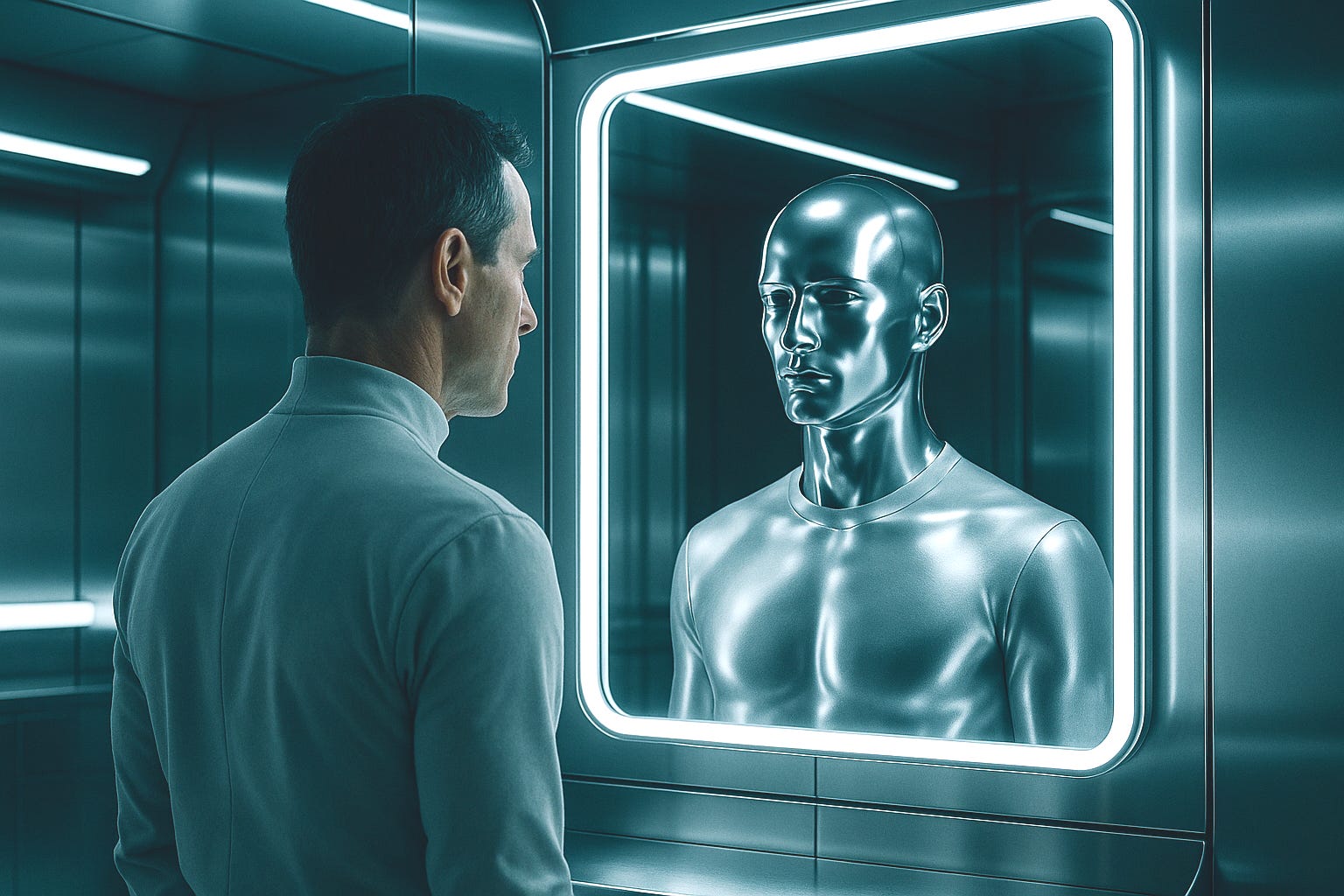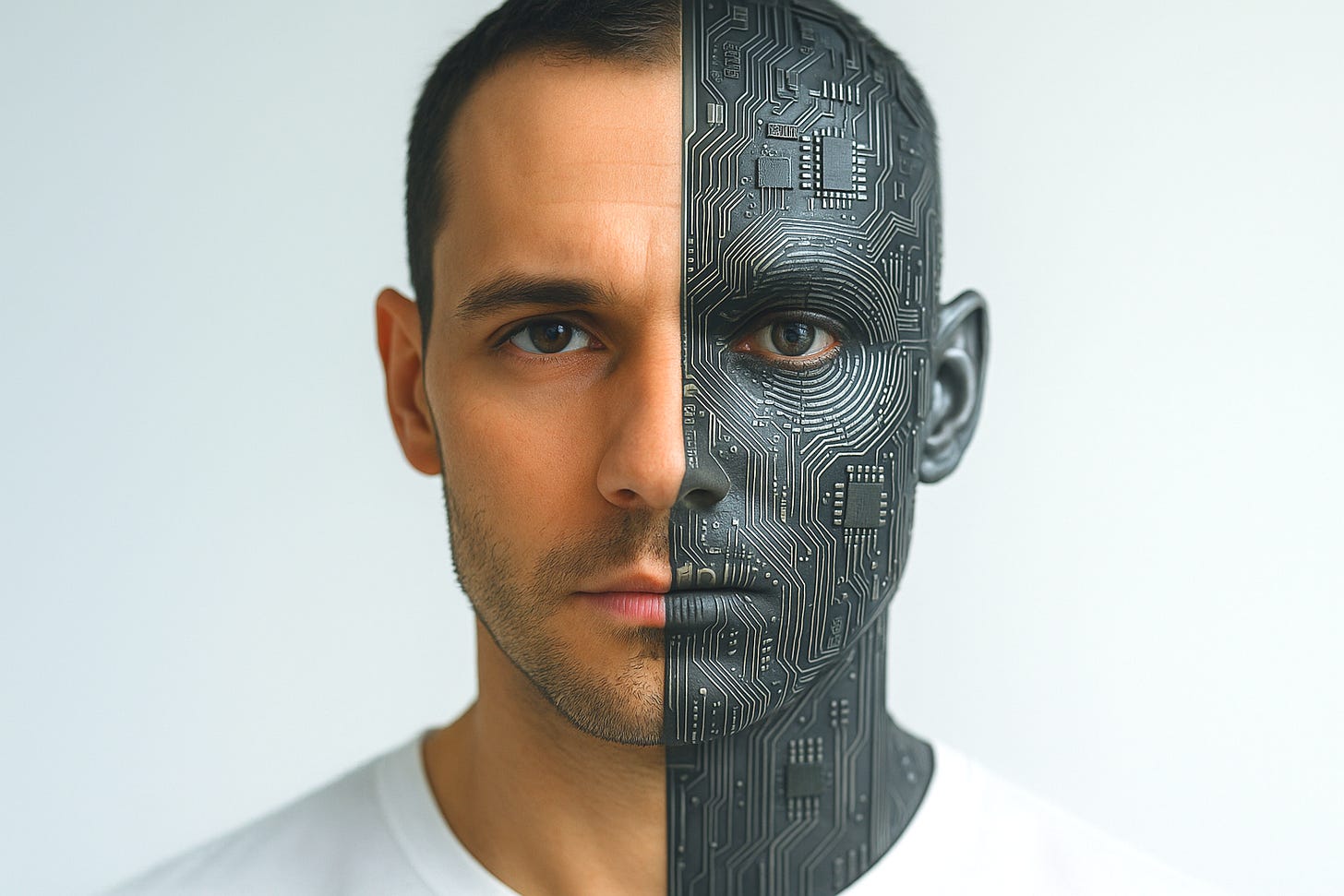The Longevity Paradox: When the Quest to Live Forever Starts to Look Like Death
On Bryan Johnson, Dave Asprey, and the sterile aesthetics of immortality

Bryan Johnson wants to live forever—or at least long enough to convince the rest of us we can, too.
The multimillionaire tech founder has spent the better part of a decade and millions of dollars “reversing” his biological age. He tracks everything—sleep, supplements, sun exposure, blood plasma, and even his erections. His daily intake is measured to the gram, his body fat hovers around 5%, and his social media feed looks more like a clinical trial than a human life.
And yet, despite all that optimization, Johnson often looks… unwell.
That isn’t an insult. It’s an observation. The people most obsessed with longevity often look the least alive.
When Health Starts to Look Like Fear
Years ago, I interviewed Dave Asprey—the self-proclaimed “Father of Biohacking”—for my Forbes column.
He was charming, articulate, and utterly convinced that immortality was just a matter of math. “I plan to live to 180,” he told me without a hint of irony. I remember smiling politely while my brain did the quiet calculus of disbelief. Because longevity sounds seductive until you start thinking about what it really means.
Who can actually afford to live that long—and who’s supposed to fund the rest of it?
Asprey’s logic was elegant but incomplete: if you control every variable—your food, light, sleep, supplements, environment—you can outsmart decay. But longevity isn’t just about biology; it’s about privilege. It’s expensive, exclusionary, and quietly dystopian. After all, if the rich get to live forever, what happens to the rest of us still aging in real time?
But even then, I remember leaving the interview unsettled.
Asprey didn’t strike me as someone fully alive; he struck me as someone performing vitality.
And in the years since, that tension has only intensified—not just for him, but for the whole biohacking movement he helped popularize.
Because somewhere along the way, the quest to extend life stopped being about living—and started being about control. Men like Bryan Johnson aren’t chasing vitality; they’re chasing invincibility. And in the process, they’ve made longevity look less like liberation and more like a hostage situation with time itself.
Which brings us to Bryan Johnson—the multimillionaire tech founder who spends millions each year on his body, blood, and biomarkers. He’s become the poster child for what I call “existential vanity”—the belief that death is just another data problem to be solved. Johnson measures every heartbeat, every calorie, every erection. He sleeps in perfect darkness, swallows dozens of supplements daily, and transfuses blood from his teenage son. His body is now a brand, his organs a portfolio.
And yet, for all the effort, for all the tech and tenacity, he still looks... haunted. Not youthful. Not vibrant. Just preserved. Like a wax museum version of what he imagines health to be.
Because the truth is, you can’t algorithm your way out of being human. You can optimize everything except joy.
Longevity Has Become the New Masculinity
Once upon a time, midlife men bought sports cars. Now, they buy blood tests
They microdose on ketones and quantify their mitochondria. They brag about how little they eat, how early they wake, and how perfectly blue their light bulbs are calibrated.
Today, longevity isn’t just about health—it’s about hierarchy. It’s a new form of status signaling, a way to perform power, discipline, and control in an era when traditional dominance has lost its shine.
But here’s the paradox: in trying to master life, these men seem to be draining the life out of it.
The Aesthetic of Immortality
Scroll through social media and you’ll see the new look of “forever”: minimalist kitchens, grayscale outfits, monotone meals. Smoothies measured by the milligram. Perfect posture, vacant eyes.
It’s health without heat. Wellness without warmth.
The body—the very miracle they’re trying to preserve—starts to look less like a vessel of experience and more like a lab sample. It’s as if the pursuit of immortality has sterilized the aesthetics of life itself.
The irony is that the more these men try to look eternal, the less human they appear.
The Fear Beneath the Science

At its core, longevity culture isn’t really about science. It’s about fear.
Fear of irrelevance.
Fear of loss.
Fear of death.
And like all fear-based systems, it manifests as control.
Control the food.
Control the light.
Control the DNA.
But control and vitality are opposites. One contracts. The other expands.
True health isn’t sterile—it’s dynamic, sensual, unpredictable. It allows for cake, for chaos, for late-night laughter that spikes your cortisol but nourishes your soul.
Longevity culture, in its current form, has forgotten that.
The Biohacking Boys Club
There’s also a gender story here. The loudest longevity voices—Johnson, Asprey, Sinclair, Attia—are men. And the language they use mirrors that: hacking, optimizing, conquering.
It’s a model of health that treats the body like a startup and aging like a hostile takeover.
Women, on the other hand, are often punished for the same pursuit.
When women chase vitality or youth, it’s vanity.
When men do it, it’s innovation.
(There is a follow up essay coming later this week from the female perspective.)
Living Longer Isn’t Living Better
To be clear: the science of aging is fascinating. The discoveries around cellular repair, mitochondrial health, and gene expression are real and important.
But the culture around longevity—the ego-driven, death-phobic, aesthetics-over-aliveness version of it—is something else entirely. It’s starting to look less like wellness and more like a form of existential panic.
Because the goal of life isn’t to extend it.
It’s to inhabit it.
And you simply can’t hack your way to balance. You can’t supplement your way to presence.
Maybe Bryan Johnson will live to 150. Maybe Dave Asprey will, too.
But if the price of immortality is the loss of wonder, appetite, and connection—then what’s the point?
Because longevity without vitality isn’t life.
It’s just a longer experiment.
Let’s Discuss
Do you think our obsession with longevity is really about health—or about control?
Would you want to live forever if it meant feeling less alive?
👇 I’d love to hear your take in the comments.
All content and concepts ©Meggen Harris. No reproduction without permission.


This is such a good article .. I was in fitness and there is a fitness influencer I used to follow along bc I thought she was the epitome of health. And then she became obsessed with longevity & Leanness and the more obsessed she became the more unhealthy it seemed to me .
It's actually a little heartbreaking-bc there is new trend with post menopausal women in fitness - extreme leanness and muscle build -is the key to longevity and overall better health. I am not a scientist or biologist and I'm long past my credentials in fitness. But imo they all look - as you described fatigued, stressed and the light in their eyes has been dimmed. There whole life is dictated by low carb high protein food rules , supplements and intense gym routines .It made me appreciate the fat on my body. The lazy days. Protecting my hips and settling into my comfy lounge wear despite not getting a million steps in that day . While I'm an advocate of health, and have been obsessed with it before- I can assuredly say my mental health is ten times better now than when I was obsessed. And my spirit is stronger. And heck no I have zero desire to live to 180 . Good heavens.
Oh, what an interesting reflection. I quite like the idea that you can't algorithm your way out of being human and that "The people most obsessed with longevity often look the least alive."
Aging is a privilege and a blessing. I find it fascinating how we're always trying to escape it.